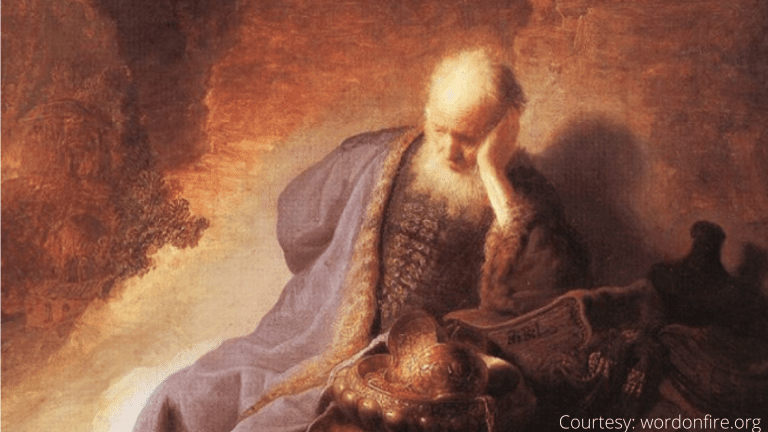 Monday: Read Revelation 15:1-8
Monday: Read Revelation 15:1-8
In 15:1-16:20, John presents us with the third series of seven: the Seven Bowls (Seals; Trumpets; Bowls). Each of the three series of sevens have been moving us toward the climax of the story. This is evident in that the Seven Seals affected one-fourth of the people; the Seven Trumpets affected one-third of the land, sea, rivers, and heavens; and now the Seven Bowls affect everything.
15:1-8 serves as an introduction to the Seven Bowls, “which are the last, because in them the wrath of God is finished” (1). It is critical for a proper understanding of the book of Revelation to recall that the Seven Seals and the Seven Trumpets depict a delay in God’s bringing of justice. And to recognize that this delay was intended to provide the nations with the opportunity to repent. Of course, we know that the repentance of the nations comes about as a result of the faithful, loving, sacrificial witness of God’s people.
The introduction to the Seven Bowls reaches a climax in 15:8: “And the temple was filled with smoke from the glory of God and from His power; and no one was able to enter the temple until the seven plagues of the seven angels were finished.”
This is a clear indication that we have arrived at the end of the story. The final judgment is about to take place. That the temple is opened and no one could enter it likely indicates that there is no more time for repentance—which was the reason why God allows the delay.
Of course, the book of Revelation has not ended. John will narrative the destruction of Babylon, the Beasts, and the Dragon, as well as the descent of the New Jerusalem in the chapters that follow.
Questions to ponder/discuss:
- Arriving at the end of the book of Revelation’s story, and the final judgment should bring us hope as well as a sense of grief. What are your thoughts/feelings? Why?
Tuesday: Read Revelation 16:1-21
It has, unfortunately, been commonplace within some circles of Christianity to read the account of the Seven Seals, Trumpets, and Bowls as though they depict God’s end times wrath.
Of course, it is true that God is sovereign. One of the things that the Seals, Trumpets, and Bowls indicate, however, is that God delays His final judgment because, in His love, He is granting humanity time to repent. Sadly, God’s delay in bringing the final judgment means that the nations continue to rule and humanity continues to suffer as a result of their rule. After all, it is the continued rule of the nations that brings death and destruction to humanity.
The account of the Seven Bowls, then, reveals inevitable result of what happens when humanity does not repent, but instead serves the Beast and its voracious appetite for wealth, power, and pleasure. The end result is the total devastation and destruction of the creation.
At the same time, the Seven Bowls also set forth God’s justice. That is, they represent the beginning of God’s response to the cry of the saints for justice (6:9-11). That they are God’s response to the cry for justice is evident from the fact that the Bowls are “poured out” (1, 2, 3, 4, 8, 10, 12, 17) upon those who “poured out the blood of saints and prophets” (6).[1]
The idea that God is the direct agent behind the Seven Bowls is tenuous at best and deeply troublesome at worst. That God is the cause behind the Bowls is most problematic in the account of the Sixth Bowl (16:12-16), which represents the unleashing of a demonically inspired war against the people of God. It is unreasonable to suppose that God is the source of this war. Furthermore, if we were to conclude that the account of the Bowls depicts God as the direct agent of wrath upon the nations, then, when all is said and done God behaves the same way the nations do: He inflicts suffering upon those who refuse to acknowledge His rightful rule.
Questions to ponder/discuss:
- Revelation 16 is a difficult read. It is difficult to understand what John is saying. And it is difficult because the reality of a final judgment is both a source of relief and a source of grief—as we discussed yesterday.
- We must keep in mind that John was writing to the churches. There is a reality to the fact that God will bring judgment. It is necessary for us to remain faithful and to lovingly proclaim the testimony of Jesus to the world.
Wednesday: Read Revelation 17:1-17
Well, if you want difficult, then Rev 17-18 will provide it. To keep it simple, 17:1-17 introduces us to the coming judgment on the Great Prostitute (1-3). What follows in 17:1-17, however, is more of a detailed description of the Great Prostitute. The judgment of the her is not described until 18:1-19.
Who is Babylon? Well, she is “the great city, which reigns over the kings of the earth” (17). She is also aligned with the Beast—after all, she is sitting on it (3).
It is again very important to remember that John is writing the churches. His goal was to show them what is really the true when it comes to the world around us. Thus, John explains that although it may look like Rome is in power, it may look like power and military might rule the world, and it may look like we need to give our allegiance to the Beast in order to survive, the reality is that Rome is a Beast and its economic system and the luxury and prosperity it provides (Babylon) is nothing more than a well-dressed and bejeweled Prostitute that is drunk on the blood of her victims (6).
Furthermore, John warns the churches that they cannot be in Christ and in Babylon. After all, Babylon will “wage war against the Lamb” (14).
Questions to ponder/discuss:
- What that being said, who/what is Babylon in our world? (this is a really tough question and one that will require some reflection, meditation, and humility: and it may takes years to even begin to discern)
Thursday: Read Revelation 18:1-19
In 18:1-19, John describes the judgment and destruction of Babylon as well as the lament of three groups: kings, merchants, and sailors. It must be recognized that 90% of the people in the Roman world lived hand to mouth. The upper 3% were the immensely wealthy. The kings, merchants, and sailors/those who “make their living by the sea” (17) are likely members of the middle 7%.
The judgment of Babylon is just. Babylon was the home to “demons and a prison of every unclean spirit, and a prison of every unclean and hateful bird” (2). Babylon is being judged because its “sins have piled up as high as heaven, and God has remembered her iniquities (5). In addition, Babylon is boastful and arrogant. Babylon’s only concern is self: she “glorified herself and lived sensuously” (7). And she believed that she was invincible (8).
Even though her judgment is welcomed by most, those who profited from her existence lament.
First, the kings lament her demise (9-10). Their grief is because they too profited from her presence and now her destruction means theirs as well” (9).
Second, the merchants lament her demise (11-17a). Rome’s extravagance was good for business—even though it came at the expense of the poor and the marginalized. As a result of Babylon’s destruction, “The fruit you long for has gone from you, and all things that were luxurious and splendid have passed away from you and men will no longer find them” (14). Hence, the merchants who moved and sold the goods lament.
Note that in 12-13, John provides a list of goods that flowed to Rome. The list contains twenty-eight items (7×4), which certainly intends to suggest that it consisted of the goods of the world. It is important to recognize that these items are essentially listed in descending order of value. Notice that the last items on the list are “slaves and human lives” (13). Rome’s wealth came at the expense of millions and millions.
Third, the sailors and those who “make their living by the sea” (17) lament because “the great city, in which all who had ships at sea became rich by her wealth, for in one hour she has been laid waste” (19).
The laments of these three groups affirms that people largely don’t care about injustice when it benefits them.
Questions to ponder/discuss:
- Today’s reading is quite grieving. Human sin and its destructiveness is overwhelming. Spend some time praying for God’s justice; then repent for anything you may have done to contribute to injustice; then ask for wisdom on how the Lord may lead you to be both a voice for justice as well as a catalyst for change.
- What do you think John meant by “Come out of her My people” (18:4)? What does coming out of Babylon look like for you/us?
- How might you have benefitted from Babylon? (before you answer this question perhaps I should we should note my last line above: “people largely don’t care about injustice when it benefits them.” The problem is that if we have benefitted from injustices we are not likely willing to admit it. We will either find ways to justify it. Or we will deny that it is injustice).
Friday: Read Revelation 18:20-19:10
The Roman system may have appeared to be a place of beauty and pleasure, But, in reality, it was built on the back of millions and millions of slaves and it was maintained at the expense of countless others. John says, “And in her was found the blood of prophets and of saints and of all who have been slain on the earth” (24).
In 18:20-19:10, we now have the response of those who have been oppressed by Roman’s wealth and power. Whereas those who benefitted from Babylon and her wealth (which were a very small percentage of people) lament, the oppressed “rejoice” (20) and shout “hallelujah” (19:1, 3, 6).
John first makes known that God will bring judgment upon such systems: “Babylon, the great city, be thrown down with violence, and will not be found any longer (21). The destruction of Babylon will be final. Never again will she be revived (21-23).
As a result, those who have persevered under the oppressive weight of the world’s systems. To them, John declares, “Blessed are those who are invited to the marriage supper of the Lamb” (19:9).
It is important to recognize that the destruction of Babylon constitutes the answer to the prayers of the saints. This is evident in that the Great Multitude proclaim, “He has judged the great harlot who was corrupting the earth with her immorality, and He has avenged the blood of His bond-servants on her” (19:2). That this is directly tied to the prayers of the saints (5:8; 8:3, 4), which is closely linked with the plea of the martyrs (6:10) is evident from the use of “avenge” in 19:2. The only other occurrence of this word is when martyrs ask, “How long, . . will You refrain from judging and avenging our blood?” (6:10). This link explicitly ties the judgment of Babylon to the martyr’s cry.
In 19:1-10, there are three “hallelujah’s” that come from the mouth of the Great Multitude (1, 3, 6). These three “hallelujah’s” are intended as the response of the people of God to Babylon’s judgment and they serve as a direct contrast to the three laments in 18:10-19.
Questions to ponder/discuss:
- Well, we only have a few days left in our year-long study. I hope and pray that this devotional guide has been a means of helping you grow in your knowledge of the Word, Jesus, and the Kingdom, as well as what it means to be His disciple and one who “follows the Lamb” (Rev 14:4).
- The description of the judgment of Babylon should be a cause for rejoicing in the same way that the fall of Hitler and the Nazi’s was. Since Babylon lives on in our world, we stand at the point in history before the final judgment of Babylon. Thus, we cannot yet rejoice as the exhortation of 18:20 says. Instead, we must continue to pray for justice.
- The challenge for those of us who live the affluent Western part of the world is that we are often the ones with much of the power and wealth. This makes reading a text like today’s quite difficult. After all, we certainly do not want to consider the possibility that we have contributed to injustices. After all, how could we be guilty since we have spent the past year doing a devotional guide through the NT. We are certainly the righteous ones in this equation. Of course, I hope that you see the danger is this assertion. The more “righteous” we are the more humble we should be. “O Lord have mercy.”
Our goal is to keep these posts free of charge. I do not intend to ever hide them behind a paywall. I can only do this if those of you who have been blessed by them and can afford to give ($5, $10, $25, or more/month) do so. You can give a tax-deductible contribution by following this link.
Please share this post and let others know about determinetruth.
If you wish to view this blog on your smartphone through the Determinetruth app simply download the “tithe.ly church” app on your smartphone and insert “determinetruth” as the church name you wish to follow. Once it is loaded, simply click on the “blog” icon and it will automatically load.
If you would like to have Rob speak at your church or organization in person or via Zoom, please let us know by filling out the contact info on the Contact me tab on this site.
[1] Many translations use “shed” in 16:6. It is important to note that the Greek uses the same verb in 16:6 to refer to the blood of the people of God that has been “poured out”—as the NAS has translated.













